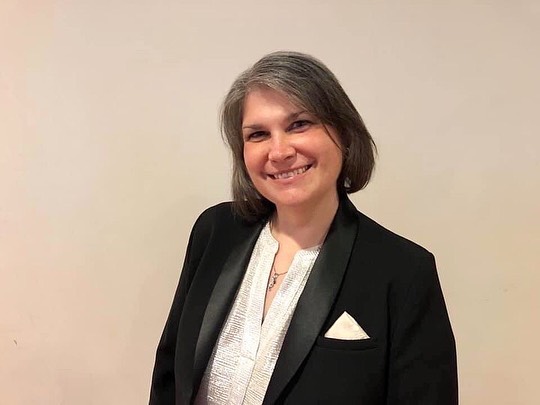Heather Clauss, MD, drew upon her deep background in infectious diseases and her natural wellspring of empathy to help guide decision-making at both the Lewis Katz School of Medicine and Temple University Hospital (TUH).
(TUH).
As Senior Associate Dean of Faculty Affairs at the medical school, she advised the late John M. Daly, MD, who was serving as the interim Dean in early 2020, on the best practices to keep the faculty and students safe with personal protective equipment, social distancing, and remote teaching. Later, when vaccines became available, she helped advise Interim Dean Amy J. Goldberg, MD, FACS, on the rollout to the School.
At the same time, as a leader in the infectious disease section at TUH, she served on hospital committees addressing how to manage the impact of the COVID-19 pandemic on patients, doctors, and staff.
Asked what leadership skills she relied upon during this challenging period when so much was unknown and all that everyone wanted was certainty, she responded:
“I think emotional intelligence and empathy most of all. I tapped into my ability to connect to people and see situations from their point of view and empathize with them.”
She also leaned in on her organizational, time-management, and communication skills. Timewise, just keeping up with the latest science was demanding, she said.
Though the latest coronavirus surge has waned, Dr. Clauss continues to offer her expertise as a member of Temple University President Dr. Jason Wingard’s COVID-19 Advisory Committee.
Now in her 20th year at Temple, Dr. Clauss this month marked her third anniversary in the Office of Faculty Affairs. She was appointed Associate Dean in March 2019 and was promoted to Senior Associate Dean in January 2020, only a few months before the pandemic upended everyday life.
One-half of her role is to serve as a university administrator, handling faculty appointments, promotions, contract renewals, tenure, and the like. The second half involves managing professional development for the 550 physicians and 150 PhD scientists at the medical school. This programming includes helping faculty develop their leadership and teaching skills and their sensitivity to diversity, equity, and inclusion issues.
Her broader goals for the Office of Faculty Affairs — a focus on equity for women faculty and underrepresented minority faculty — is at the forefront of her work.
“I think we’re closer than most other institutions,” she said. “Temple has always cared about this.”
She noted that the medical’s school interim dean and three of the four senior associate deans are women, as are many assistant deans and associate deans.
“Our leadership reflects the gender distribution of the medical school class,” she said. “Certainly, we still have a way to go on racial and ethnic diversity in our faculty, compared to our medical school classes.”
She expects recruiting and retaining underrepresented minority faculty to be her most significant focus over the next several years. To this end, Dr. Clauss participates in a leadership group convened by Interim Dean Goldberg that meets once a week to discuss diversity, equity, and inclusion issues involving the faculty and student experience at Lewis Katz School of Medicine
“We’ve made a lot of strides, over the last year,” she said. “We’ve really devoted an intense amount of energy to teaching both faculty and students about these important issues.”
Dr. Clauss grew up in Allentown, Pa., and graduated from Muhlenberg College. She received her medical degree from the Medical College of Pennsylvania Hahnemann University (now Drexel College of Medicine) in 2002. That year, she came to Temple for her internship, a medical residency in internal medicine, and a fellowship in infectious diseases. She went on to join the Temple faculty in 2008.
She was drawn to medicine because it combined her keen interest in science with important humanistic qualities. “Practicing medicine is an art, and it’s about the human connection -- one doctor connected to one patient in one hospital or exam room,” she said.
Dr. Clauss credits her mother with encouraging her to become a doctor and wanting to make sure she was unencumbered by career barriers. “There was no ceiling,” Dr. Clauss said. “That was the message I took from her growing up.”
As a specialist in infectious diseases, Dr. Clauss is often brought into a case as a consultant when the diagnosis isn’t clear or when a doctor has diagnosed certain types of infections.
In this specialty, physicians are taught to look simultaneously at the patient from the 30,000-foot view and the microscopic view of lab tests. “We look at the patient and their social circumstances and all the things that have led them to being in the hospital bed in front of us. It’s about asking why as many times as it takes,” she said.
Dr. Clauss said she tries to offset the demands of her job by committing herself to regular exercise and to practicing mindful meditation. She describes herself as being “in a great space and a great place.”
And that’s the same well-being she wants for the faculty, too.
“I hope that our hard-working faculty can carve out time for themselves, for their families, and for the other things that are important to them — in addition to being fantastic scientists and physicians. That’s been my consistent message in Faculty Affairs.”
“That’s really why I took the job. It’s for faculty development and helping our faculty be the best teachers for students and best doctors for patients that they can possibly be.
“I’m as loyal to Temple as they come,” she said. “Maybe there are other places as good as Temple, but there is nowhere better."
- Lillian Swanson
